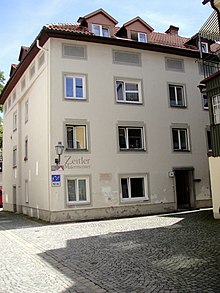Therese Studer
Therese Studer (born September 22, 1862 in Senden ; † January 21, 1931 in Sendling , Munich ) was the founder of Catholic workers 'associations and the first association secretary at the Southern German Association of Catholic Workers' Associations, and from 1920 the association chairwoman.
Life
Therese Studer grew up in difficult family circumstances without a mother. When she was eight she had to go to work for a farmer and work hard. She was only able to attend school in winter. Became ill when the father, she began 16 years piecework in the Winkl Eschen match factory Altenstadt to afford to feed their family. When the factory closed, she became a maid, after which she worked in the textile factory in Ay an der Iller .
In the evening Therese devoted herself to further training with the help of books. Through this self-study she acquired a certain education. The shift work and long working days (often from 5 a.m. to 7 p.m. or until midnight) demanded their strength.
In large parts of the traditional population, factory work was associated with a negative image and a preliminary stage of immorality, because the men and women mostly worked together "close up" in a very small space. Studer fought against these prejudices , she tried to improve the status of the workers in society, was a role model for the young workers in Ay and also rebuked the men if they dared to approach her in an “unjust way”.
In 1884 she applied in the modern spinning and weaving mill in Kaufbeuren and for a place to live in the Marienanstalt there , a dormitory for workers run by Franciscan women. During this time Therese read a lot and also wrote plays that were staged in the Marienanstalt and were very popular with the population. Gradually, she had more influence both in the dormitory and in the factory, and was also able to make decisions about hiring and firing. She turned down the offer to become a teacher because she did not want to join the order. Studer lived in the workers' dormitory until 1906.
The social democratic trade unions and the Catholic workers' associations largely excluded women from their educational offerings. Therese Studer therefore founded a group of Catholic women workers in Kaufbeuren. On February 12, 1906, a Catholic workers' association from southern Germany was founded. Therese Studer and foundation priest Rupfle founded a local branch on June 17, 1906, which 159 members immediately joined and which grew to 460 over the next few months. At the beginning of July 1906 she also opened a payment office for the Christian textile union in her company. Every week the women met in the Marienanstalt to sing and play theater, but also for board meetings that took place in Therese's room. Therese Studer also designed a club flag on which the Holy Kreszentia can be seen on the loom.
In April 1907 she was offered the first time to accept a position as secretary of the general association. A year later she accepted the position at the request of Carl Walterbach in Munich . She worked there with great idealism and diligence. In the first three years of her activity as the association's first full-time secretary, she was involved in the founding of 19 workers' associations and visited a total of 72. In 15 cases, however, the founding of the association failed because the respective local clergy assumed that women naturally belong in the family and that there should therefore be no problems with female workers. Therese Studer succeeded significantly in leading the workers 'association to a size of 21,000 members and thus making this association an equal partner of the workers' association.
In 1915 she fell ill with rheumatism , so she had to give up her position and could only concentrate on administrative work at the Munich headquarters. In 1920 she was elected chairwoman of the association, an honorary position that she carried out until her death.
Commemoration
On January 31, 2001, the 70th anniversary of Therese Studer's death, a memorial service took place in the Church of St. Jodok in Senden. Originally they wanted to put a plaque on the house where she was born that day, but the owner refused. So a room in the “House of Encounter” was named after her. In 2007, the newly opened Seniors' Meeting at the old weaving mill was given the name “Therese-Studer-Haus”.
In Munich, where she died, a street was named on June 6, 2002. A street in Kaufbeuren is also named after her.
literature
- Nicole Lutz, Nadine Mörz: "On the whizzing loom of time ...". The rise and fall of the Pfersee plant in Ay. With a photo documentation by Joachim Grosser, Senden ad Iller 2005
- Franz-Josef Körner: Sophie's labyrinth. Historical Kaufbeurer novel. A book about four centuries, three famous women, about love and the eternal questions of life. Bauer-Verlag: Thalhofen, ISBN 978-3-941013-00-1
- Ronny Baier: STUDER, Therese. In: Biographisch-Bibliographisches Kirchenlexikon (BBKL). Volume 21, Bautz, Nordhausen 2003, ISBN 3-88309-110-3 , Sp. 1474-1478.
Individual evidence
- ↑ Stadt Senden, History ( page no longer available , search in web archives ) Info: The link was automatically marked as defective. Please check the link according to the instructions and then remove this notice.
| personal data | |
|---|---|
| SURNAME | Studer, Therese |
| BRIEF DESCRIPTION | Founder of Catholic workers 'associations, first association secretary at the South German Association of Catholic workers' associations |
| DATE OF BIRTH | September 22, 1862 |
| PLACE OF BIRTH | Send |
| DATE OF DEATH | January 21, 1931 |
| Place of death | Sendling , Munich |
